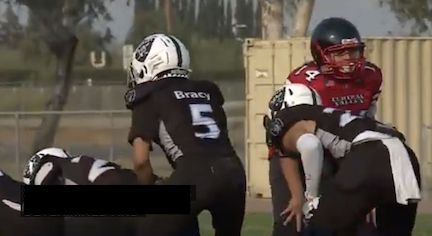Ascend the Mountain with Jesus
Denver, Colorado is 5,276 feet above sea level, hence the nickname “Mile High City.”
The altitude there has been credited and blamed for the effects it has on unaware or unprepared visitors from lower elevations. People feel the effects of lower air pressure and decreased oxygen when they arrive; the same goes for visiting athletes.
Sure, they’re better conditioned than Joe or Jane Average, but they’re drawing more on the thin air in their competitive exertions. Many, if they’re honest, have stories to tell about needing rather quickly to find their second wind and taking a few days to acclimate enough that their performances don’t suffer.
Such teams as the Nuggets, Avalanche, Broncos, and Rockies actually employ marketing schemes to plant seeds doubt in visiting teams, amplifying the disadvantages posed to those athletes who are not properly altitude trained. For example, at Ball Arena, there is signage where visiting teams enter and exit noting the city’s altitude. The numbers 5,280 are printed right on the court, near each free-throw line. The video board during introductions welcomes the road team with an ominous warning about the difficulty in catching one’s breath. Then, there are large, hazard-orange-and-black placards on display (“Attention: Altitude Warning/Low Oxygen”).
In fact, the intimidating marketing is right there in the name ... "Empower Field" at "Mile High Stadium"!

In response, we often see oxygen tanks used on the visiting teams’ sidelines to help them try to catch their breath.
There is a whole school of athletic training based on high-altitude workouts. Olympic athletes routinely seek out facilities in Denver and Colorado Springs to boost their oxygen efficiency, and countless trainers and gyms simulate the effects with dedicated breathing equipment.
In Matthew 5, we see the Lord ascend up the mountainside to preach his most famous, and frankly, one of his most challenging sermons — aptly named the Sermon on the Mount. He wasn't bringing a milquetoast message of "peace, love, and hippy beads." No, he was bringing a challenging message of radical transformation which was not for the faint of heart and would require spiritual training and preparedness.
The disciples went up the mountain with Jesus. To go up the mountain is to risk one’s balance: our ears might pop; we might get dizzy; we might trip. We might hear something we cannot handle. Making the climb is the first step, and it is already a commitment. Staying on the summit and realizing we could do even more requires more courage, and letting that experience transform us, transfigure us, can be scarier still. But the effort is worthwhile. The vista is gorgeous.
To receive this kind of message we must spiritually train to make the best use of the "air" up there — Jesus' words of truth and life. Afterall, "All Scripture is breathed out by God and profitable for teaching, for reproof, for correction, and for training in righteousness, so that the servant of God may be thoroughly equipped for every good work" (2 Timothy 3:16-17, NIV).
Playing Blind
Jasen Bracy always wanted to play football, but retinal cancer he developed as a toddler took his eyesight by the time he was age 7. How could he play a fast-paced contact sport like football if he couldn't see?
This was the question before him. Yet young Jasen would not be dissauded. As he got older, he began calling around to different youth leagues to see if there were any teams that would take a chance on a kid who was sold out to following and relying on the guidance and direction of others to make his dreams come true. He found just such a team in the Modesto Raiders.
"The way he was on the phone, I just said, 'Come on we'll figure it out,'" coach David Nichols told CBS News.
Jasen started out as a running back, but soon advanced to ... wait for it ... quarterback!
"It's all memory," Jasen said. "It's all about having trust in the player, the receiver and the team. I have to trust them 100%.

Upworthy reports:
Bracy's teammates guide him into position on the field and his dad coaches him from the sidelines using a walkie-talkie that transmits to his helmet. "After the play starts, I may tell him, 'Hey, run to your right, let's get upfield,' or 'Watch out, somebody's coming to hit you,'" Bracy Sr. said.
All that trust, all that deep leaning into guidance and direction seems to have paid off. Not long after, Bracy led the Raiders to a 33-6 win.
You do not need to be sighted to walk in the ways of the Lord. It is not our eyes, but the "eyes of our hearts" that we need opened. When we trust in His Word, His will, and his ways, our path will always be clear. His eye and His mighty hand will guide us! As He says in His word, "I will instruct you and teach you in the way you should go; I will counsel you with my eye upon you" (Psalms 32:8, ESV).
Commit to the Lord's guidance, and commit His Word to your memory. Follow Jasen's example, "It's all about memory ... It's all about having trust ... [You] have to trust [Him] 100%."
"The steps of a man are established by the Lord, when he delights in his way; though he fall, he shall not be cast headlong, for the Lord upholds his hand" (Psalms 37: 23-24, ESV).
"Trust in the LORD with all your heart and lean not on your own understanding; in all your ways submit to him, and he will make your paths straight" (Proverbs 3:5-6, NIV).
Of the Word and Waterjets
In the past, only one piece of metal could be cut at a time with a saw or other metal cutting mechanical process. It took a lot of time and was expensive. Then came the invention and use of waterjets.
Low pressure waterjets were first used for mining gold in California in 1852. Steam and hot water jets were used in the early 1900s for cleaning. High pressure waterjets were used for mining in the 1960s. During the mid 2000s waterjets started to be used for cutting.
A waterjet is a tool used to cut with a (very) high pressure stream of water. Think of a waterjet as something with about 30 times the pressure of the power washer wand at our local car wash. Power washing at car washes is an example of a dirt film being “cut” off the body, wheels, and tires of our vehicles. The key to cutting metal with water is to keep the spray coherent. Waterjets are able to cut because the spray is channeled through a very narrow jeweled nozzle as a very high pressure to keep the spray coherent.

Waterjets can cut marble, granite, stone, metal, plastic, wood, and stainless steel. They can cut a sandwich of different materials up to four inches thick.
Unlike metal cutters, a waterjet never gets dull and it cannot overheat.
We are told in Scripture, "For the word of God is alive and active. Sharper than any double-edged sword, it penetrates even to dividing soul and spirit, joints and marrow; it judges the thoughts and attitudes of the heart" (Hebrews 4:12, NIV). It NEVER wears out, NEVER gets dull, NEVER overheats, but applies exactly the amount of heat needed for conviction or instruction.
God has given us this immensely powerful, useful tool. Wield it wisely!
"And take the helmet of salvation, and the sword of the Spirit, which is the word of God" (Ephesians 6:17, ESV).